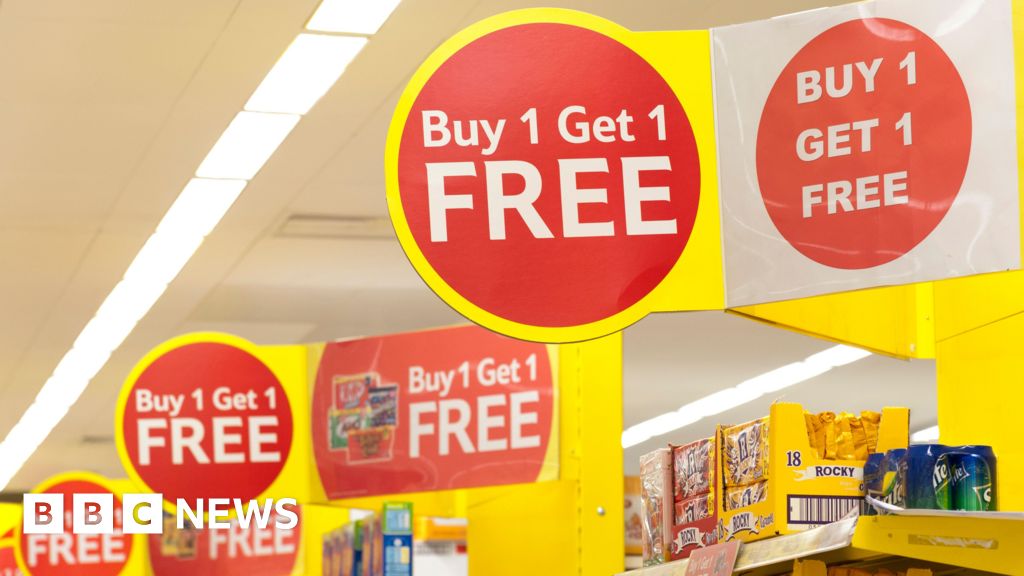Nick TriggleHealth correspondent
Price or multibuy promotions on unhealthy food and drink, such as “buy one, get one free” deals, are to be banned in England from Wednesday.
The restrictions will apply to supermarkets, larger high street shops and online retailers.
The measure has been under consideration for years but has been put off because of the cost-of-living crisis.
Ministers argue the restrictions are an important step to tackle obesity – and in particular childhood obesity.
The regulations also ban free refill promotions of certain drinks in restaurants and cafes.
It will be followed by a ban on the advertising of less healthy food and drink on television before 21:00 and a complete ban on online promotions from January.
A Department of Health and Social Care spokesman said the restrictions were a “crucial step” in giving children a healthy, happy start in life.
“Obesity robs children of the best possible start in life, sets them up for a lifetime of health problems and costs the NHS billions.”
The government has introduced a classification system to define what food and drinks are classed as unhealthy, which is based on the products thought to have most influence on child obesity.
So, in terms of drinks it includes fizzy drinks such as lemonade and cola that contain sugar.
And for food it covers everything from crisps, sweets and chocolates to ice creams, pastries, cakes, fishfingers and some pizzas.
What difference will it make?
Obesity rates have risen sharply over recent decades, with more than a quarter of adults and a fifth of children at the end of primary school classed as obese.
Greg Fell, president of the Association of Public Health Directors, said this move should not be seen as a “silver bullet”, but said it was long overdue, arguing it should not have been delayed from 2022 in the first place.
“Multi-buy promotions do not save people money – in fact, they encourage them to spend more.
“They are designed to encourage impulsive purchases and to normalise buying more and more frequently.”
He said he hoped retailers would now turn towards promoting healthy products more, to make healthier choices easier and more accessible.
Obesity rates had risen at an unprecedented rate over the years and were now a “key driver” of health inequalities as people in more deprived areas were nearly twice as likely to be obese, Mr Fell added.
“These are a long-overdue first step, but the government is far away from meeting its manifesto commitment to end junk food advertising to kids.”
In particular he said there needed to be a tightening of restrictions on sponsorship of sporting and leisure events, as well as wider society investment to promote active travel and improve the quality of food in schools.
There is evidence to suggest restrictions on the promotion and sale of unhealthy products can have an impact.
A University of Leeds study published earlier this year looked at the impact of the one measure introduced in 2022 as planned – the ban on selling unhealthy products at key locations, such as checkouts, aisle ends and store entrances.
Before the ban, 20 out of every 100 items sold were what was classed as unhealthy, while after that it dropped to 19.
The researchers said this worked out at two million fewer products per day.
Although it was also noted there was a downward trend for the sale of these products before the legislation was introduced and high rates of inflation could also have had an impact.
There has been industry lobbying of government against the restrictions over the years.
But some retailers, including Sainsbury’s and Tesco, introduced their own restrictions some time ago.
And Andrea Martinez-Inchausti, from the British Retail Consortium, said the vast majority of his members were already now compliant.
“There will not be a big change for them.
“Food retailers are supporting their customers to make healthier choices through better calorie labelling, reformulation of products, and portion control.”
Wales is introducing similar restrictions next year and Scotland has said it will follow suit.
Former prime minister Boris Johnson first announced a UK-wide ban on TV adverts for food high in sugar, salt and fat before 21:00 to help tackle the problem in 2021.
The ban was later delayed to 2025, with the Conservative government saying it wanted to give the food and drink industry time to prepare for the change because of the cost of living crisis.
Source link : https://www.bbc.com/news/articles/c89d54gv44qo?at_medium=RSS&at_campaign=rss
Author :
Publish date : 2025-10-01 06:00:00
Copyright for syndicated content belongs to the linked Source.
